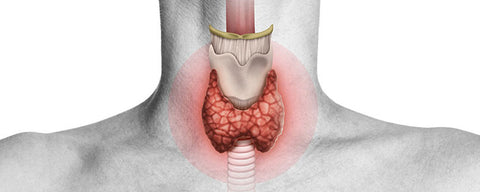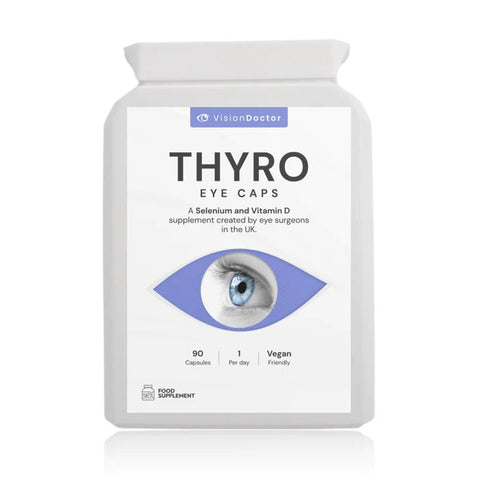Brought to you by two of the UK's most experienced and trusted eye surgeons, here is all you need to know about thyroid eye disease, Graves' disease and selenium and vitamin D.
The thyroid gland is a bit like the thermostat that controls our bodily functions, such as how hot and cold we are, how fast we metabolise what we eat, our heart rate and even our mood. And the thyroid gland can malfunction; it can become over or under active. There are various reasons that this can happen, but one common one is when the body produces little inflammatory particles called antibodies that land on the thyroid gland and either stimulate it to be overactive or inhibit its activity. This is called an autoimmune disease, or a disease in which the body kind of attacks itself. Other autoimmune diseases that you might have heard of are rheumatoid arthritis (where antibodies attack the joints) and Crohn's disease and ulcerative colitis in which the antibodies attack the intestine and bowel.
In the thyroid gland the antibodies cause inflammation which means the thyroid gland gets swollen and red. These antibodies do something else very strange…they also attack the eyelids and eye sockets, causing inflammation of the muscles and fat. And just like the thyroid gland the muscles and fat and glands that produce tears (lacrimal glands) become red and swollen.
This can cause anything from a little bit of dry or watery eye, to swelling, redness and puffiness of the eyelids or even to really serious problems where the eyes are pushed forward (proptosis) and double vision and even loss of vision can occur due to the pressure on the nerve behind the eye. We don’t really know why these antibodies mainly affect the thyroid gland and the eyes, but we think there are probably the same kind of receptors (docking places for antibodies) in both places.

Graves' disease is the combination of on overactive thyroid gland and inflammation around the eye and a less common condition called Hashimoto's disease is the same but with an underactive thyroid gland.
So this is all very interesting, but what have selenium and vitamin D got to do with it?
Selenium is a trace mineral that fights off free radicals in the body. Free radicals can cause a lot of harm in the body. Selenium is thought to play an important role in all functions of the eye and in the healthy functioning of the thyroid gland. One very major scientific study showed that taking selenium supplements significantly reduced the severity of Graves' disease.
Vitamin D has a major role in controlling the amount of calcium and phosphate in the body. It is also thought to play a role in the immune system and may help reduce inflammation in the body. Some research has suggested that vitamin D may help support the thyroid gland when in an underactive state (hypothyroidism). Low levels of vitamin D have also been associated with an overactive thyroid gland (hyperthyroidism).
Many of us have low vitamin D and selenium levels and supplementation (which can be done through diet and exposure to sunlight or with supplements) is recommended for many people and particularly those with thyroid problems and thyroid eye disease.





